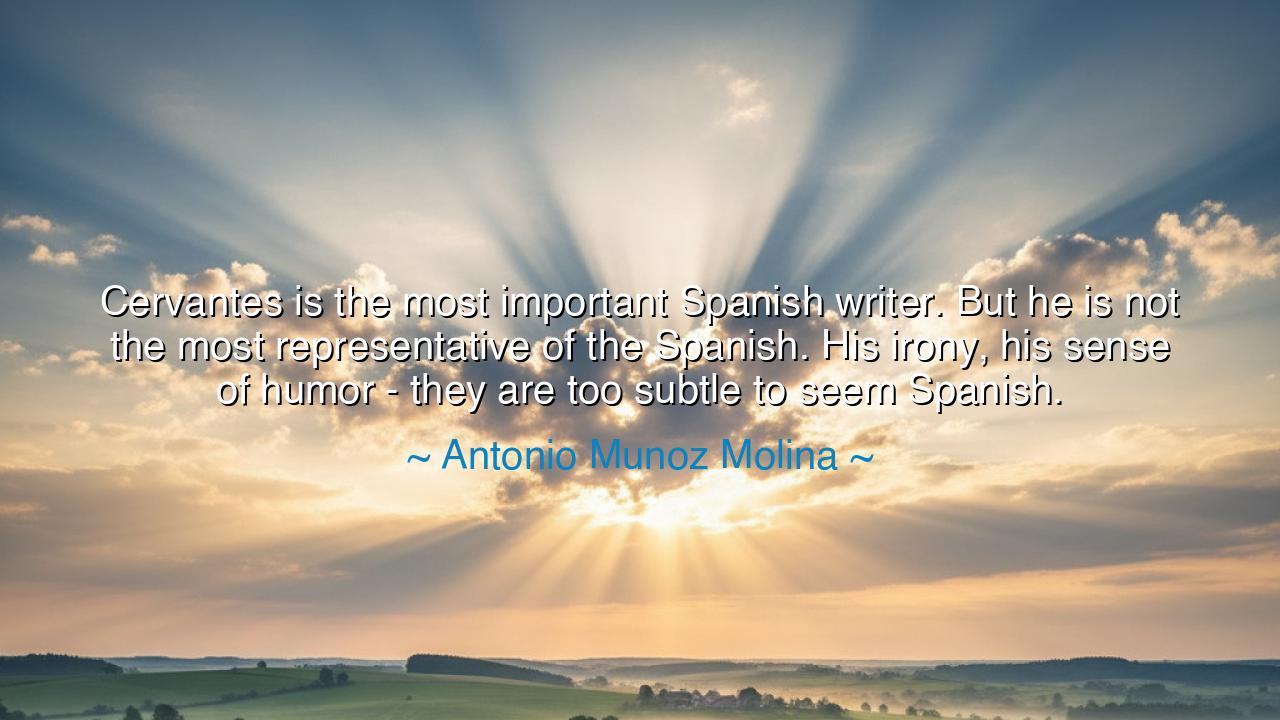
Cervantes is the most important Spanish writer. But he is not the
Cervantes is the most important Spanish writer. But he is not the most representative of the Spanish. His irony, his sense of humor - they are too subtle to seem Spanish.






In the realm of literature, where the written word is not merely a collection of symbols but the very pulse of a nation’s soul, there are those whose works stand as towering monuments, casting their shadow over generations. One such figure is Cervantes, the Spanish master whose Don Quixote endures as a beacon of literary genius. Yet, as Antonio Muñoz Molina observes, "Cervantes is the most important Spanish writer. But he is not the most representative of the Spanish. His irony, his sense of humor—they are too subtle to seem Spanish." These words carry with them a profound truth: the soul of a nation, and of its humor, is often more direct, more bold, and less inclined toward the nuanced irony that Cervantes wielded so masterfully.
In the ancient world, humor was often as bold as the cultures that birthed it. Consider Aristophanes, the great Athenian playwright, whose comedy was sharp, loud, and unapologetically direct. His humor was a vehicle for social critique, a means of mocking the powerful and revealing the absurdities of the world in the most unmistakable of ways. In the same spirit, Cervantes’ humor could have appeared unfamiliar to his contemporaries—a humor so subtle and layered that it might escape the attention of those not ready to see the complexities beneath the surface. Muñoz Molina's reflection highlights this difference: Cervantes’ irony is not the laughter of the masses, but the quiet smile of one who recognizes the absurdities of human ambition and the nobility in folly.
The irony in Cervantes’ work is a quiet revolution in itself. It does not shout, but it whispers truths that are often more painful to hear than any outright critique. Like the ancient philosophers, who used irony not to mock, but to reveal the contradictions within society, Cervantes employed a humor that invites reflection. His Don Quixote, with its portrayal of a knight lost in the world of his own idealism, reflects a deep respect for humanity’s imperfections. Cervantes’ humor does not degrade human frailty, but embraces it, asking the reader to recognize the noble side of every absurd pursuit. Muñoz Molina highlights this subtlety of Cervantes’ humor, suggesting that it is not the loud, outwardly expressive humor that often defines Spanish character, but something quieter, more contemplative.
In contrast to Cervantes’ subtlety, the Spanish character, as often perceived, is bold and direct, quick to speak and act. This can be seen in the traditions of flamenco, where every movement is charged with emotion, and in the art of bullfighting, where the grandeur and bravery of the matador are celebrated. These cultural expressions are marked by a directness that stands in stark contrast to the nuanced and reflective humor of Cervantes. The Spanish spirit, in its loudness and bravado, might find it difficult to embrace the quiet, cerebral irony that Cervantes embodies. Yet, this is precisely why Cervantes stands apart as a figure of universal significance. His work asks the reader to find meaning in silence, to recognize the absurdity of life not through the clash of swords, but through the gentle collision of dreams and reality.
The ancient story of Achilles, the greatest of the Greek warriors, offers a vivid example of this balance. Achilles’ anger and his eventual humility are profound contradictions—he is both a hero and a flawed human being. His rage, so direct and powerful, is contrasted by the quiet understanding that Cervantes captures so subtly in his characters. While Achilles’ humor may not be the subject of legend, his humanity is clear: his actions, both tragic and comic, remind us that the greatest warriors, like the greatest writers, must ultimately recognize the absurdity of their own follies. In this sense, Cervantes brings the human experience to life with a sense of grace and humility that is both universal and deeply personal.
The lesson we take from Muñoz Molina’s reflection is that Cervantes’ humor is not a reflection of national identity, but of the deeper, more universal truth that lies beneath the surface of all cultures. In Cervantes, we find the perfect blend of wit and humanity, a humor that reveals the fragility of our dreams while honoring the nobility of our pursuits. His irony asks us to look beyond the obvious, to question not just the world around us, but the very ideals that shape our existence. Just as Cervantes did with his characters, we, too, must learn to embrace nuance in our own lives, finding meaning in both the absurdity and grandeur of human existence.
Let us take this wisdom into our own lives. When we face the challenges of our own times, let us not seek to define ourselves by the loudness of our actions or words, but by the depth and subtlety of our understanding. Like Cervantes, let us embrace the irony that resides within our greatest ideals, recognizing the humanity in both our triumphs and failures. For it is in this embrace of both the bold and the subtle, the tragic and the comic, that we truly understand the fullness of the human experience.






AAdministratorAdministrator
Welcome, honored guests. Please leave a comment, we will respond soon